Werner Erhard interviewing Al Neuharth
http://wernererhardvideo.com/werner-erhard-interviews-al-neuharth-july-11-1987
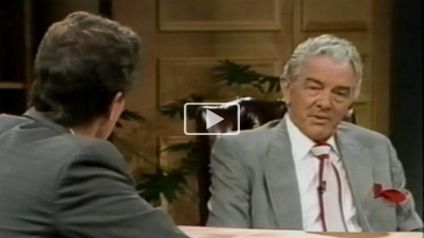 |
|||
|
Werner Erhard interviewing Al Neuharth (1924 - 2013) on the business of money, during the Saturday Satellite Seminar Series, on Saturday July 11, 1987. Time 1:24:37 Allen Harold "Al" Neuharth is the founder of the Freedom Forum, a nonpartisan foundation that champions the First Amendment as a cornerstone of democracy. The Freedom Forum funds and operates the Newseum, the First Amendment Center, and the Newseum Institute. He was senior advisory chairman of the Freedom Forum from 1986 to 1997, and was a trustee of the foundation and its predecessor, the Gannett Foundation, from 1965 to 1999. He is the founder of various newspapers, most notably USA Today. He worked at the Miami Herald where he was assistant managing editor. He then worked at the Detroit Free Press with Knight‑Ridder, then ran the Democrat and Chronicle for Gannett. During his tenure at Gannett he bought the Detroit News. He eventually took charge of Gannett in Florida, building Gannett into the largest newspaper company in the United States. Under Al, Gannett's revenues expanded 1,450%, with Gannett owning seventy eight daily newspapers, twenty one weekly newspapers, seven television stations, over a dozen radio stations, to mention a few of their media holdings. At Gannett he started the newspaper Today which eventually became Florida Today and was the inspiration for USA Today which, as of March 2013, is the third most widely read newspaper in the United States. [source: wikipedia]
|
Werner Erhard interviewing Alice Cahana
http://www.wernererhardvideo.com/alice-cahana-2
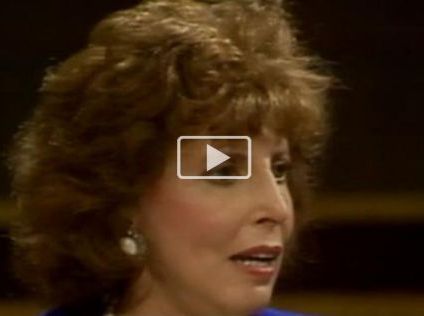 |
|||
|
Werner Erhard interviewing world renowned artist Alice Cahana who celebrates Life inside of the holocaust experience. Time 1:06:45 Alice Cahana is a Hungarian holocaust survivor. She was a teenage inmate in the Auschwitz-Birkenau, Guben, and Bergen-Belsen camps. She is most well known for her writings and abstract paintings about the holocaust. Much of her work is a tribute to Swedish diplomat Raoul Wallenberg who saved her father during the second world war. In 2006 her piece No Names was added to the Vatican museum's collection of modern religious art, and since then is on permanent display at the museum in Rome, Italy. Her work appears in multiple prestigious museum collections around the world including Yad Vashem in Jerusalem and the United Stated holocaust memorial museum in Washington DC. She is one of five Hungarian holocaust survivors whose story is featured in the Steven Spielberg 1999 Academy Award winning documentary The Last Days. Her writing is featured in the book The Best Spiritual Writing 2011. [source: wikipedia]
|
Werner Erhard interviewing Andrew Tobias
http://wernererhardvideo.com/werner-erhard-interviews-financial-journalist-andrew-tobias-on-creating-a-powerful-relationship-with-personal-finances
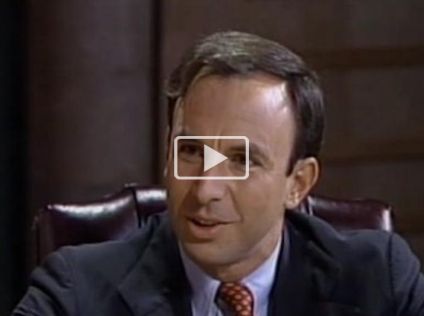 |
|||
|
Werner Erhard interviewing financial journalist Andrew Tobias, Harvard Business School MBA ie Master of Business Administration graduate, author, contributing editor for New York Magazine, and writer for Esquire, Playboy, Time, and Parade, on creating a powerful relationship with personal finances. Time 1:31:08 Andrew Tobias' main body of work is on investment, but he also writes on politics, insurance, and other topics. Since 1999 he has been the treasurer of the Democratic National Committee. He also has a BA ie Bachelor of Arts degree in Slavic languages and literatures from Harvard College. Among his titles on investment are The Only Investment Guide You'll Ever Need, The Only Other Investment Guide You'll Ever Need, My Vast Fortune, Money Angles, The Invisible Bankers: Everything the Insurance Industry Never Wanted You to Know, and The Funny Money Game. He wrote his autobiography The Best Little Boy in the World under the pen name John Reid in 1973. He used a pen name because he wasn't comfortable yet with publicly disclosing his homosexuality to a broad audience. This book was later re‑published in 1998 under his real name to coincide with the sequel The Best Little Boy in the World Grows Up. Although he has never been employed in the investment industry, his writing and successful investing on his own behalf have brought him great success in it. He has also achieved success in in the software industry with his Andrew Tobias' Managing Your Money financial application. In 2005 he served as Grand Marshall of the New York City LGBT ie Lesbian, Gay, Bisexual, and Transgender Pride parade. [source: wikipedia]
|
Werner Erhard interviewing James Burke
http://www.wernererhardvideo.com/james-burke-werner-erhard-interviews-distinguished-bbc-producer-and-creative-educator-on-chaos-and-order-in-our-lives
 |
|||
|
Werner Erhard interviewing distinguished BBC ie British Broadcasting Corporation producer and creative educator James Burke on chaos and order in our lives. Time 1:38:59 James Burke is a broadcaster, science historian, author, and television producer. The Washington Post has called him one of the most intriguing minds in the western world. He established his reputation as a reporter on the BBC science series Tomorrow's World. He was BBC television's science anchorman and chief reporter for the Project Apollo missions as the main presenter of the BBC's coverage of the first moon landing in 1969. In collaboration with Mick Jackson, he produced the ten part documentary series Connections in 1978 which was first broadcast on the BBC and subsequently on PBS ie Public Broadcasting Service in the United States. Connections was the most watched PBS television series to that time. It was followed by the twenty part Connections 2 in 1994, and the ten part Connections 3 in 1997. Connections (subtitled An Alternative View of Change) was broadcast in more than fifty countries. In 1985 he, with Richard Reisz and John Lynch, produced the ten part series The Day the Universe Changed which concentrated on the philosophical aspects of scientific change in western culture. In contrast to the conclusion of Connections in which he said computing and communications might be controlled by a computer science elite, in the conclusion of The Day the Universe Changed he suggested a worldwide revolution in communications and computer technology would allow people to instantaneously exchange ideas and opinions. He has also been a regular writer for Scientific American and Time, and a consultant to the BBC, and subsequently on the SETI ie Search for ExtraTerrestrial Intelligence project. He has received the gold and the silver medals of the Royal Television Society. In 1998 he was made an honorary fellow of the Society for Technical Communication. He has also contributed to podcasts such as in 2008 when he appeared on Hardcore History with Dan Carlin, and newspaper articles including two series for the Mogollon Connection by Jesse Horn, one focusing on the nature of morality, the other on the future of our youth. He is the leading figure of the KnowledgeWeb project, the digital realization of his books and television programs which allows the user to travel through history and create his or her own connections. In an article for the Radio Times in 1973 he predicted the widespread use of computers for business decisions, the creation of metadata banks of personal information, and changes in human behavior such as greater willingness to reveal personal information to strangers. [source: wikipedia]
|
Werner Erhard interviewing Kareem Abdul-Jabbar
http://wernererhardvideo.com/werner-erhard-interviews-kareem-abdul-jabbar-on-creativity-in-performance
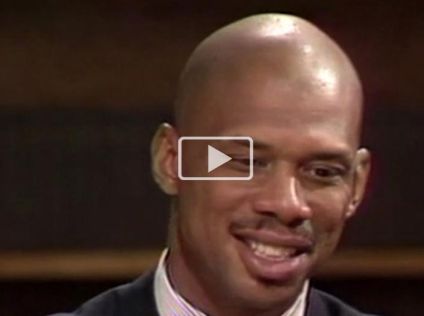 |
|||
|
Werner Erhard interviewing Kareem Abdul-Jabbar on creativity in performance. Time 1:06:08 Kareem Abdul-Jabbar is the leading scorer in the history of the NBA ie National Basketball Association. During his career he was an NBA MVP ie Most Valuable Player a record six times. He holds records as a nineteen time NBA All-Star, a fifteen time All-NBA Selection, and an eleven time NBA All-Defensive team member. A member of six NBA championship teams, Kareem Abdul-Jabbar was twice voted NBA Finals MVP. In 1996 he was named one of the fifty greatest players in NBA history. At the time of this interview with Werner Erhard in the ground breaking Saturday Satellite Seminar Series, he was the leading star of the Los Angeles Lakers. He had just signed a contract through the 1989 - 1990 season, his twentieth year in a sport where few athletes survive beyond four seasons. [source: wikipedia]
|
Werner Erhard interviewing Mike Wallace
http://wernererhardvideo.com/werner-erhard-interviews-60-minutes-mike-wallace-on-the-art-of-an-interview
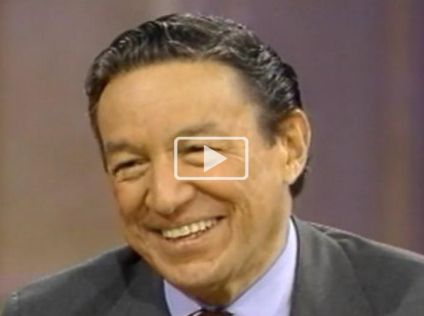 |
|||
|
Werner Erhard interviewing Mike Wallace (1918 - 2012) on the art of an interview. Time 1:19:45 Mike Wallace is a journalist, game show host, actor, and media personality. He has interviewed a wide range of prominent newsmakers during his sixty year career. He was one of the original correspondents for CBS's ie Columbia Broadcasting System's 60 Minutes which debuted in 1968. He retired as a regular full-time correspondent in 2006 but still appeared occasionally on the series until 2008. His professional honors include twenty one Emmy Awards, one for a report just weeks before the 9/11 terrorist attacks, on an investigation into the former Soviet Union's smallpox program and concerns about terrorism. He has also won three Alfred I duPont-Columbia University Awards, three George Foster Peabody Awards, a Robert E Sherwood Award, a Distinguished Achievement Award from the University of Southern California School of Journalism, and a Robert F Kennedy Journalism Award in the international broadcasting category. In September 2003 he received a Lifetime Achievement Emmy, his twentieth. Most recently he was awarded the University of Illinois prize for lifetime achievement in journalism. [source: wikipedia]
|
Werner Erhard interviewing Milton Friedman
http://www.wernererhardvideo.com/milton
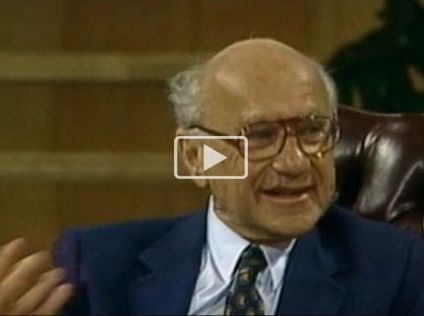 |
|||
|
Werner Erhard interviewing Milton Friedman (1912 - 2006), a leader in economic science, on long term issues of finance. Time 1:31:33 Milton Friedman is an economist, statistician, and writer. He taught at the University of Chicago for more than three decades. He is a recipient of the 1976 Nobel prize in economic sciences. He is known for his research on consumption analysis, monetary history and theory, and the complexity of stabilization policy. As a leader of the Chicago School of Economics, he profoundly influenced the research agenda of the economics profession. A survey of economists ranked him as the second most popular economist of the twentieth century after John Maynard Keynes. The Economist described him as the most influential economist of the second half of the 20th century ... "possibly of all of it". He was an economic adviser to President Ronald Reagan. His political philosophy extolled the virtues of a free market economic system with minimal intervention. He once stated that his role in eliminating United States conscription was his proudest accomplishment, and his support for school choice led him to found The Friedman Foundation for Educational Choice. In his 1962 book Capitalism and Freedom, he advocated policies such as a volunteer military, freely floating exchange rates, abolition of medical licenses, a negative income tax, and education vouchers. His ideas concerning monetary policy, taxation, privatization and deregulation influenced government policies, especially during the 1980s. His monetary theory influenced the Federal Reserve Bank's response to the global financial crisis of 2007 - 2008. His works include many monographs, books, scholarly articles, papers, magazine columns, television programs, videos, and lectures, all of which cover a broad range of topics of microeconomics, macroeconomics, economic history, and public policy issues. His books and essays are widely read and have had an international influence, including in former communist states. [source: wikipedia] [addtional biographical material, quotes: Libertas Bella]
|
Werner Erhard interviewing Robert Rauschenberg
http://www.wernererhardvideo.com/robert-rauschenberg
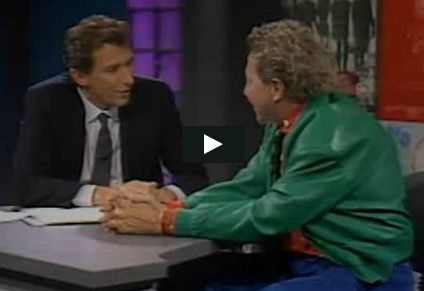 |
|||
|
Werner Erhard interviewing Robert Rauschenberg (1925 - 2008) during the Saturday Satellite Seminar Series in San Francisco, California, USA on Saturday November 19, 1988. Time 32:19 Considered by many to be one of the most influential American artists due to his radical blending of materials and methods, Milton Ernest "Robert" Rauschenberg was a crucial figure in the transition from Abstract Expressionism to later modern movements. One of the key Neo-Dada movement artists, his experimental approach expanded the traditional boundaries of art, opening up avenues of exploration for future artists. Although Rauschenberg was the enfant terrible of the art world in the 1950s, he was deeply respected and admired by his predecessors. Despite this admiration, he disagreed with many of their convictions and literally erased their precedent to move forward into new aesthetic territory that reiterated the earlier Dada inquiry into the definition of art. [sources: THE ART STORY, wikipedia]
|
Werner Erhard interviewing Robert Reich - Excerpts
http://www.youtube.com/watch?v=dVzXewm4Nic&feature=youtu.be
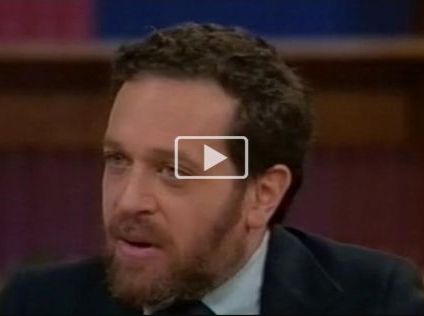 |
|||
|
Werner Erhard interviewing (excerpts) Robert Reich on exercising creative leadership in society. Time 14:53 Click here for full version. Click here for biography.
|
Werner Erhard interviewing Robert Reich - Full Version
http://www.wererhardvideo.com/exercising-creative-leadership-in-society
 |
|||
|
Werner Erhard interviewing (full version) Robert Reich on exercising creative leadership in society. Time 1:03:33 Click here for excerpts. Robert Reich is a political economist, professor, author, and political commentator. He served in the administrations of Presidents Gerald Ford and Jimmy Carter, and was Secretary of Labor under President Bill Clinton. He is Chancellor's Professor of Public Policy at the Goldman School of Public Policy at the University of California at Berkeley, formerly a professor at Harvard University's John F Kennedy School of Government, and professor of social and economic policy at the Heller School for Social Policy and Management at Brandeis University. He has also been a contributing editor of The New Republic, The American Prospect (for which he was also chairman and founding editor), Harvard Business Review, The Atlantic, The New York Times, and The Wall Street Journal. He is a political commentator on programs including Hardball with Chris Matthews, This Week with George Stephanopoulos, CNBC's ie Consumer News and Business Channel's Kudlow and Company, and APM's ie American Public Media's Marketplace. In 2008 Time Magazine named him one of the ten best Cabinet members of the century. Also in 2008 The Wall Street Journal placed him sixth on its list of the most influential business thinkers. He was a member of President-elect Barack Obama's economic transition advisory board. He has published fourteen books including the best sellers The Work of Nations, Reason, Supercapitalism, Aftershock: The Next Economy, America's Future, and the best selling e-book Beyond Outrage. The Robert Reich / Jacob Kornbluth film Inequality For All won a United States Documentary Special Jury Award for achievement in filmmaking, at the 2013 Sundance film festival. [source: wikipedia]
|
Werner Erhard interviewing Senator Daniel Inouye
http://wernererhardvideo.com/werner-erhard-interviews-senator-daniel-inouye
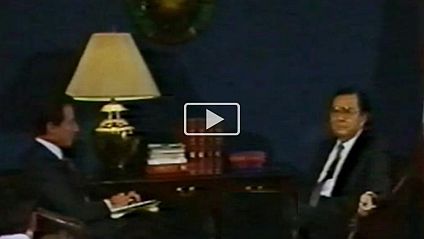 |
|||
|
Werner Erhard interviewing Senator Daniel Inouye (1924 - 2012). Time 2:16:18 Senator Inouye is a United States Senator from Hawai'i, the second longest serving Senator in United States history, and the Chairman of the United States Senate Committee on Appropriations. He is a recipient of the Medal of Honor and the Presidential Medal of Freedom. He served as President pro tempore of the Senate, making him third in the presidential line of succession after the Vice President and the Speaker of the House of Representatives. He is the first Japanese American to serve in the United States House of Representatives and later the first in the United States Senate. He is the highest ranking Asian American politician in United States history. He has never lost an election in fifty eight years as an elected official. [source: wikipedia]
|
Werner Erhard interviewing Stephen Jay Gould
http://www.wernererhardvideo.com/gould
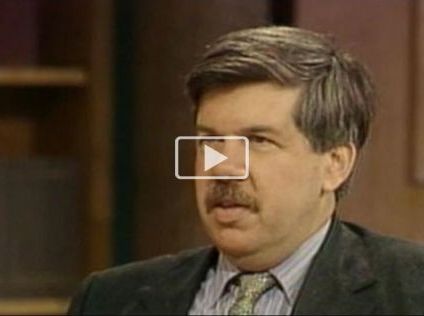 |
|||
|
Werner Erhard interviewing scientist Stephen Jay Gould (1941 - 2002) in an intriguing conversation on the philosophy and creativity of science. Time 1:05:28 Stephen Jay Gould is a paleontologist, evolutionary biologist, and science historian. He is also one of the most influential and widely read writers of popular science of his generation. He spent most of his career teaching at Harvard University and working at the American Museum of Natural History in New York. In the later years of his life he also taught biology and evolution at New York University. His most significant contribution to evolutionary biology was the theory of punctuated equilibrium which he developed with Niles Eldredge in 1972. The theory proposes that most evolution is marked by long periods of evolutionary stability which is punctuated by rare instances of branching evolution. The theory was contrasted against phyletic gradualism, the popular idea that evolutionary change is marked by a pattern of smooth and continuous change in the fossil record. He also contributed to evolutionary developmental biology, and has received wide praise for his book Ontogeny and Phylogeny. He campaigned against creationism, and proposed that science and religion should be considered two distinct fields whose authorities do not overlap. He was known by the general public mainly for his three hundred popular essays in Natural History magazine, and for his books written for a non‑specialist audience. In April 2000 the United States Library of Congress named him a "living legend". [source: wikipedia]
|
Werner Erhard interviewing William F Buckley Jr
http://wernererhardvideo.com/werner-erhard-interviews-william-f-buckley-rigorous-exercise-in-thinking
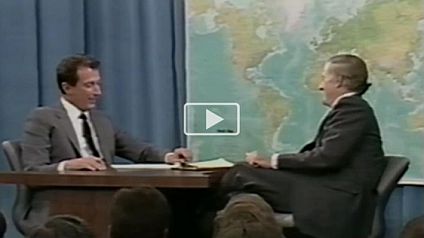 |
|||
|
Werner Erhard interviewing William F Buckley Jr (1925 - 2008) in a rigorous exercise in thinking. Time 2:08:22 William Frank Buckley Junior is a conservative author and commentator. He founded the political magazine National Review in 1955 which had a major impact in stimulating the conservative movement. He hosted one thousand four hundred and twenty nine episodes of the television show Firing Line from 1966 until 1999, in which he became known for his transatlantic accent and wide vocabulary. He also wrote a nationally syndicated newspaper column and numerous spy novels. George Nash, a historian of the modern American Conservative movement, says "William F Buckley Jr is arguably the most important public intellectual in the United States in the past half century - for an entire generation, he is the pre-eminent voice of American conservatism and its first great ecumenical figure.". His primary contribution to politics is a fusion of traditional American political conservatism with laissez-faire economic theory and anti‑communism, laying groundwork for the new American conservatism of United States presidential candidate Barry Goldwater and President Ronald Reagan. He wrote God and Man at Yale in 1951, and over fifty other books on writing, speaking, history, politics, and sailing, including a series of novels featuring CIA ie Central Intelligence Agency agent Blackford Oakes. He refers to himself as either a libertarian or conservative. He resides in New York City and Stamford, Connecticut. He is a practicing Catholic, regularly attending the traditional Latin mass in Connecticut. [source: wikipedia]
|
